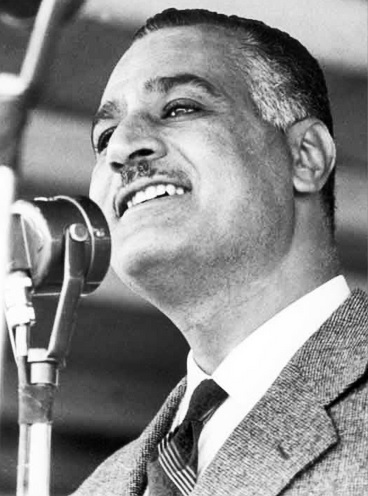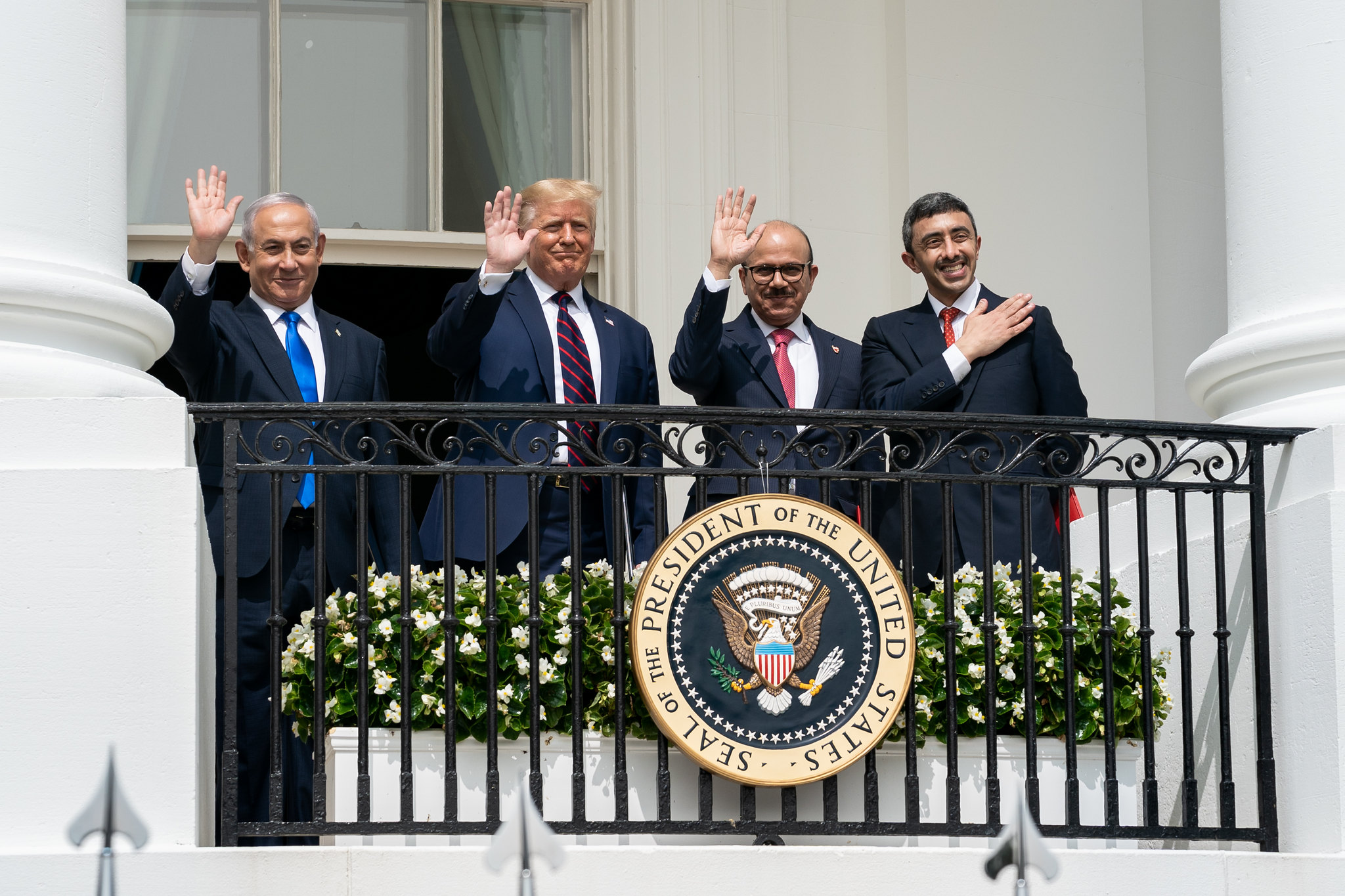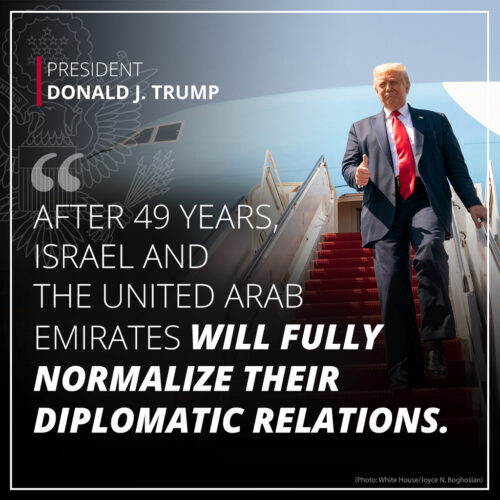As`ad AbuKhalil highlights the role of the Saudi crown prince in the current wave of U.S.-brokered deals.

Crown Prince of Saudi Arabia Mohammad bin Salman in 2019. (Kremlin)
By As`ad AbuKhalil
Special to Consortium News
 The wave of Arab normalization with Israel has continued unabated. Clearly, the Trump administration — desperate for (an imagined) foreign policy accomplishment — stumbled on an easy way to claim to the American people, and even to Congress, that it has been responsible for Arab rapprochement with Israel, and that Israel is now secure in the region.
The wave of Arab normalization with Israel has continued unabated. Clearly, the Trump administration — desperate for (an imagined) foreign policy accomplishment — stumbled on an easy way to claim to the American people, and even to Congress, that it has been responsible for Arab rapprochement with Israel, and that Israel is now secure in the region.
President Donald Trump’s policy worked. Media pundits and congressional members from both parties cheered the news.
House Speaker Nancy Pelosi, while applauding the normalization announcement, expressed concern for Israeli security. So, Pelosi does not think that Trump, with all that he has done for Israel and the cause of its occupation and aggression, has done enough.
This confirms that the Democratic Party leadership is far removed from its base on Israel. And this is not unusual in Western democracies, that liberal or even socialist parties (as in France) remain solidly pro-Israel at the leadership level while the base expresses increasing support for the Palestinian cause.
Gulf despots know that the quickest road to Congress is through Tel Aviv.

President Donald J. Trump, seated, with from left, Bahrain’s Minister of Foreign Affairs Abdullatif bin Rashid Al-Zayani, the UAE’s Foreign Minister Abdullah bin Zayed Al Nahyan, and Israeli Prime Minister Benjamin Netanyahu, during the signing of the Abraham Accords, Sept. 15, 2020, in the Oval Office. (White House, Andrea Hanks)
Arab despots, and even the PLO under Yasser Arafat and Mahmoud Abbas, have operated under this dictum. Nonetheless, much has been made about the initiative by the UAE, and later Bahrain, to sign a peace treaty with Israel, at a time when Israel is adamantly opposed to offering any concession to the Palestinian people.
While the UAE claimed — in Arabic— that it has achieved victory because it obtained an Israeli decision to halt annexation of 30 percent of the West Bank, the Israeli leader Benjamin Netanyahu made it clear that the annexation plan is still on “the table.”
The role of Mohammad bin Salman, or MbS, has not been highlighted enough in the normalization march.
The Arab League

Egypt’s immensely popular Gamal Abdel Nasser. (Wikimedia)
It is fair to say that since its ascendancy in Arab politics after the death of Egypt’s Gamal Abdel Nasser in 1970, the Saudi regime has been primarily in charge of setting the tone and course of the Arab League’s stances and declarations toward peace with Israel.
Nasser was the Arab world’s most popular leader since Saladin in the 12th century.
He bitterly feuded with the Saudi regime and other Gulf despots until 1967, when his military defeat made him dependent on Arab oil assistance.
After 1991, Syria’s Hafiz Al-Asad, Egypt’s Husni Mubarak and King Fahd of Saudi Arabia were the trio who controlled the Arab League.
They all served to legitimize U.S. military intervention in the Middle East.
At first it was in the name of “liberating” Kuwait. Then it was in the name of opposing tyranny and terrorism — and whatever else the U.S. came up with. (Lately, in regards to Lebanon, Washington mixes in its anti-Hizbullah and anti-corruption rhetoric, despite the subservience of the entire corrupt Lebanese ruling class to the U.S.)
The Saudi government was behind the “Arab Peace initiative” of 2002 when Israel was offered “full” peace and normalization (not sure what “full” means) in return for a Palestinian state in the West Bank, Gaza and East Jerusalem.
The fall of Saddam Husayn in Iraq and the Syrian war changed the Arab League’s leadership structure, leaving it in the hands of the Saudis. (The Qatari regime tried in 2011, in the wake of the Arab uprisings, to steer the Arab League in its direction and in favor of the Muslim Brotherhood but that did not last.)
Checkbook Foreign Policy
The Saudi regime ensures loyalty with its checkbook foreign policy, buying off heads of states and prime ministers in the region. A president in Lebanon receives $5 million from the Saudi government while the Sunni prime minister receives $20 million, although there were some presidents and prime ministers who were denied that largesse.
Please Contribute to Consortium News’
25th Anniversary Fall Fund Drive
The Palestinian Authority in Ramallah was pleased to receive Gulf funding and to continue in its unending dedication to the U.S.-orchestrated “peace process.”
No matter how many decades have elapsed since the launch of the Rogers Plan in 1970, the Palestinian Authority has to cling to whatever U.S. diplomatic initiatives there are because it reached a point of political bankruptcy and it had (under Arafat) surrendered the only leverage it had, i.e. armed struggle against Israeli occupation.
But the Saudi regime was still constrained in its attempts after Sept. 11 to initiate contacts with the Israeli apartheid state. It had the political legitimacy that it derives from its alleged protection of the two holiest sites in Islam, in Mecca and Medina, to consider. It was also wary of offending the sensibilities of the Saudi citizens who were raised not only on natural Arab pro-Palestinian sympathies but have been subjected for decades to repugnant anti-Semitic state-sponsored indoctrination in school textbooks and media.
To be sure, the kingdom managed to initiate unprecedented steps after Sept. 11 to avoid the wrath of the U.S. Congress: like arranging for talks with Israelis under the banner of “dialogue of religions.” (That dialogue did not extend to members of minority sects inside the kingdom. At the time, the kingdom was sponsoring an unprecedented campaign against Shiites throughout the region.)
The Saudi kingdom, especially under MbS, was not sure that it could afford the heavy domestic price of open (diplomatic) normalization at a time of generational transition in rulership.
The Influence of MbS
But since then, MbS has exerted increasing influence and is responsible for the recent wave of Arab despotic normalization with Israel.
It is his way of signaling his intentions to the U.S. and Israel, while still refraining from the final step, still waiting to fully seize power. The regimes that normalized (Bahrain and the UAE) and the regimes that may very well normalize (Sudan and Oman) answer to the Saudi regime and won’t dare take that step without prior authorization.
In other words, MbS is normalizing with Israel, but through his proxies.

Hailing the Abraham Accords, from left: Israel’s Prime Minister Benjamin Netanyahu, U.S. President Donald J. Trump, Bahrain’s Foreign Minister Abdullatif bin Rashid Al-Zayani and UAE’s Foreign Minister Abdullah bin Zayed Al Nahyan. Sept. 15, 2020. (White House, Andrea Hanks)
Saudi Media Change Rhetoric
The Saudi media have been festively reporting on the benefits of normalization and the old anti-Semitic rhetoric of Saudi media has been replaced with anti-Palestinian rhetoric plus attacks on Arabs who believe in armed resistance to Israeli occupation.
The Wall Street Journal reported that MbS personally issued a directive ordering that Saudi regime media treat the news of normalization favorably. The Saudi regime had been preparing the stage for years. I just learned from a source inside Saudi-regime media that orders have been received, throughout that sphere, to refrain from using the word “normalization” and to replace it with the word “peace” instead. I know that the Saudi-owned Arabic Independent was quick to implement the change.

Official U.S. graphic. (State Department, Flickr)
A recent article in The Wall Street Journal also seems to bear the hallmark of MbS, who still holds sway over some Western media . He often uses the WSJ and Bloomberg to float trial balloons for Western audiences.
In this recent article, MbS wanted the West to believe that he was trying to normalize with Israel but that his father was preventing him from reaching peace with Israel.
This rather conveniently fits into the aims of MbS: He wishes to blame his father for lack of normalization while extracting a bigger prize for normalization than the UAE. (It is still not clear what the UAE’s Muhammad Bin Zayid, or MbZ, obtained from his normalization except the approval of Trump and a shipment of F-35 fighter jets).
MbS is not truthful when he maintains in various leaks to Western media that his father is adamantly opposed to normalization. MbS may have now put all Saudi media firmly under his control, but various Saudi newspapers used to serve as mouthpieces for different Saudi princes.
Ash-Sharq Al-Awsat, for instance, which is now run by MbS personally, used to deviate from declared Saudi policies on Israel when it was owned by then Prince Salman and run by his sons. Long before MbS appeared on the scene, Ash-Sharq Al-Awsat was the least pro-Palestinian of all Saudi-regime newspapers, and it was the first to contract American Zionists to write on its pages.
It was the first Saudi outlet to actually propagate messages of normalization with Israel. The notion that MbS is not able to normalize because of his father is an unconvincing excuse.
Jamal Khashoggi

Street sign put up by protesters in front of the White House. 2019. (Jami430, CC BY-SA 4.0, Wikimedia Commons)
What MbS wants more than anything is the ability to obtain forgiveness for his crime against Jamal Khashoggi. Much of Western media may have forgotten that crime, but The Washington Post still wages an unrelenting campaign on behalf of its former columnist.
While the Post does not seem bothered by the Saudi regime’s crimes against people in Yemen or even inside Saudi Arabia, it was “corporately” or personally offended that MbS dared to kill a person employed by an American newspaper.
MbS wants to be able to visit Europe and the U.S. again and he knows full well that peace with Israel would win immediate accolades among Western governments and its media. If peace with Israel managed to erase the Nazi, anti-Semitic past of Egypt’s Anwar Sadat and his brutal repression, surely MbS can achieve forgiveness for the Khashoggi murder in return for a peace treaty with Israel.
MbS wants to be paid an exorbitant price. He may be negotiating for American endorsement of his ascension to the throne, probably before election time. And typical of the Trumpian foreign policy, this transactional arrangement would achieve the throne for MbS and a great “achievement” — by the standards of U.S. media and D.C. pundits — for Donald Trump.
Furthermore, MbS may be a bit concerned about a Joe Biden presidency, but he knows deep down that all U.S. Democratic presidents have been as supportive of Gulf despots as Republican presidents.
Trump has achieved PR victories for Gulf despots in the lead-up to the elections and they may prefer him to Biden, but not by much.
MbS and MbZ particularly like Jared Kushner, Trump’s son in law, and prefer doing business with him because it avoids the regular diplomatic channels, which Gulf despots distrust. But those peace treaties hinge on the perpetuation of the rule of those despots.
As with Egypt, the U.S. would be obligated to maintain the rule of those despots to maintain normalization. U.S. investment in Egypt since 1979 only brought misery and oppression to the lives of Egyptians, but it brought contentment in Tel Aviv.
The people of the Gulf may have just won a few more decades of U.S.-Israeli support for despotism in their region — all in the name of normalization.
As’ad AbuKhalil is a Lebanese-American professor of political science at California State University, Stanislaus. He is the author of the “Historical Dictionary of Lebanon” (1998), “Bin Laden, Islam and America’s New War on Terrorism (2002), and “The Battle for Saudi Arabia” (2004). He tweets as @asadabukhalil
The views expressed are solely those of the author and may or may not reflect those of Consortium News.
Please Contribute to Consortium News’
25th Anniversary Fall Fund Drive
Donate securely with
Click on ‘Return to PayPal’ here.
Or securely by credit card or check by clicking the red button:



Show Comments